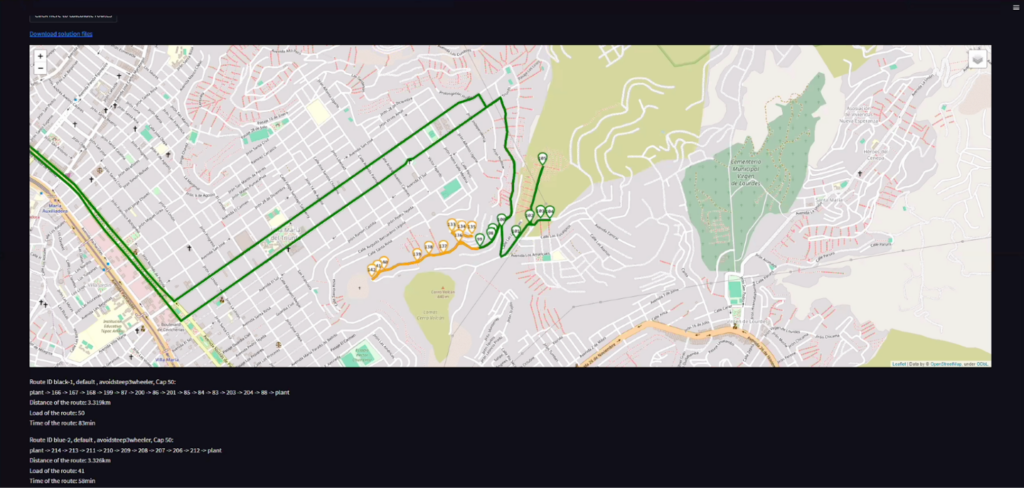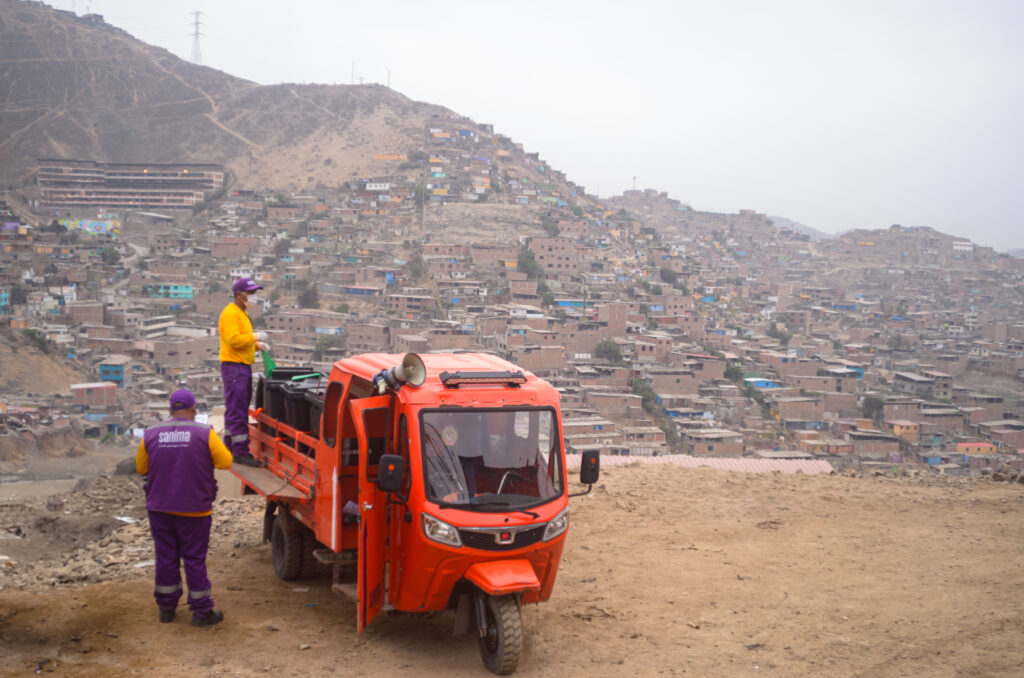Sanima, a Peruvian nonprofit, is pioneering sustainable, safe, and dignified sanitation alternatives in Lima. To help improve their service delivery and scale their vital services, DataKind partnered with Sanima to optimize waste collection routes, using (and enhancing) our Container-Based Action Routing Tool (CART). Meeting the unique needs of sanitation in complex urban environments, our collaboration optimizes business operations, but also plays a crucial role in improving public health and quality of life of urban residents.
Background
The global health crisis caused by the lack of access to safe sanitation facilities disproportionately affects the most vulnerable populations living in urban areas, resulting in preventable illnesses and fatalities. With limited resources and infrastructure available to address these issues, innovative interventions, such as Container-Based Sanitation (CBS), is a game-changer. CBS offers a scalable, affordable, and hygienic solution to the sanitation crisis in urban areas, especially for underserved communities, by providing access to safe toilets and efficient waste management. Despite the benefits of CBS, local providers face numerous operational challenges, including high costs, difficulty reaching hard-to-reach households, and managing growing volumes of waste.
Partner Introduction
Sanima has been providing safe and sustainable sanitation alternatives to homes that do not (or cannot) have a connection to the public water and sewerage network in Lima for the past 11 years. Sanima’s approach is rooted in CBS – and to serve their 7600+ individuals, they need to meticulously plan logistics to collect waste in sealed containers regularly, and empty, transport, and treat the waste to prevent environmental contamination.
In Lima, where rapid urbanization has outpaced infrastructure development, sprawling settlements cling to the steep hillsides, and with scarce water resources and often unstable soil conditions, CBS has proven to be revolutionary.
“We aspire for every person in Peru to have the opportunity to exercise their right to safe, dignified, and sustainable sanitation.” ~ Arturo Llaxacondor, CEO, Sanima
Sanima’s rapid growth in recent years has exposed the limitations of its old, driver-knowledge-based routing system. As Lima expands and more families gain access to Sanima’s vital services, the need for a more robust, scalable solution becomes apparent.
“We face a constant challenge due to infrastructure issues, geography, lack of defined routes, and the absence of urban planning in Lima’s urban settlements. This makes the areas in which we work difficult to access and the collection routes complex. Therefore, it is crucial to develop tools that optimize and make our routes more efficient.” ~ Milagros Arcos, Operations Manager, Sanima
Container-Based Action Routing Tool
Enter the Container-Based Action Routing Tool, or CART. CART is a service equipped with algorithms that efficiently considers a multitude of factors essential for effective planning. It’s able to route through hundreds of locations in minutes, and automatically distribute assignments across the vehicle fleets used for container-based sanitation, creating optimal routes.
In Haiti, where CART was initially developed in partnership with SOIL, CART has already cut route distances for CBS providers by ten percent, leading to significant fuel savings and increasing their capacity to serve more families. The solution also helped SOIL onboard new drivers as they scale their services and easily reassign existing drivers to new areas.
Since then, DataKind has also been working with Sanergy/Fresh Life to deploy CART in Nairobi, Kenya.
The Collaboration
Working with Sanima gave DataKind the opportunity to add significant enhancements to CART to meet the unique demands of Lima’s complex urban landscape.
Key enhancements:
- Incorporation of road difficulty data, accounting for factors like steepness and surface conditions
- Prioritization of collection points based on vehicle load limits
- Scalability to automatically adjust routes and staffing needs as the customer base expands

The implications of this technology extend far beyond mere logistics. By optimizing routes, Sanima will be able to reduce its operating costs, potentially making its services more affordable for Lima’s poorest residents (right now 80 percent of the cost is borne by Sanima, which they cover primarily through charitable fundraising).
More efficient pickups also mean fewer missed collections, reducing the risk of waste accumulation and associated health hazards in densely populated areas. CART can route through hundreds or thousands of locations in minutes. As Lima’s population grows and more households gain access to Sanima’s services, CART can automatically adjust routes and staffing needs, ensuring efficient operations even as the customer base expands.
“Without an efficient collection service and proper management, the lack of sanitation can compromise the health and dignity of communities, highlighting the urgent need for inclusive and sustainable solutions such as those provided by Sanima. Therefore, the CART tool is essential to more effectively scale up our service by facilitating the optimization of resources so that more households can exercise their right to safe, dignified, and sustainable sanitation.” ~ Milagros Arcos, Operations Manager, Sanima
The Broader Impact
The success of CART in Lima has broader implications for urban sanitation efforts worldwide. DataKind has designed the system to be adaptable, potentially serving as a model for waste management companies in other developing cities facing similar challenges.
However, the implementation of such advanced technology in resource-constrained environments is not without its challenges. Sanima is investing heavily in developing in-house expertise to maintain and update the system, as well as establishing robust data governance processes to ensure the tool’s continued accuracy and effectiveness.
As cities grapple with rapid urbanization and its attendant sanitation challenges, the story of CART in Lima offers a glimpse into a future where data science doesn’t just optimize business operations, but plays a crucial role in improving public health and quality of life for millions of urban residents.
The DataKind collaboration with Sanima was led by Sebastian Ouellet, Ratri Maria, and Handre Williams.
Images courtesy of Sanima.
Join the DataKind movement.
- Interested in supporting our work? Donate here.
- Interested in sponsoring a project? Partner with us.
- Interested in volunteering with DataKind? Look no further.
- Interested in working at DataKind? We’re hiring!
- Interested in submitting a project? Go for it!
Quick Links



